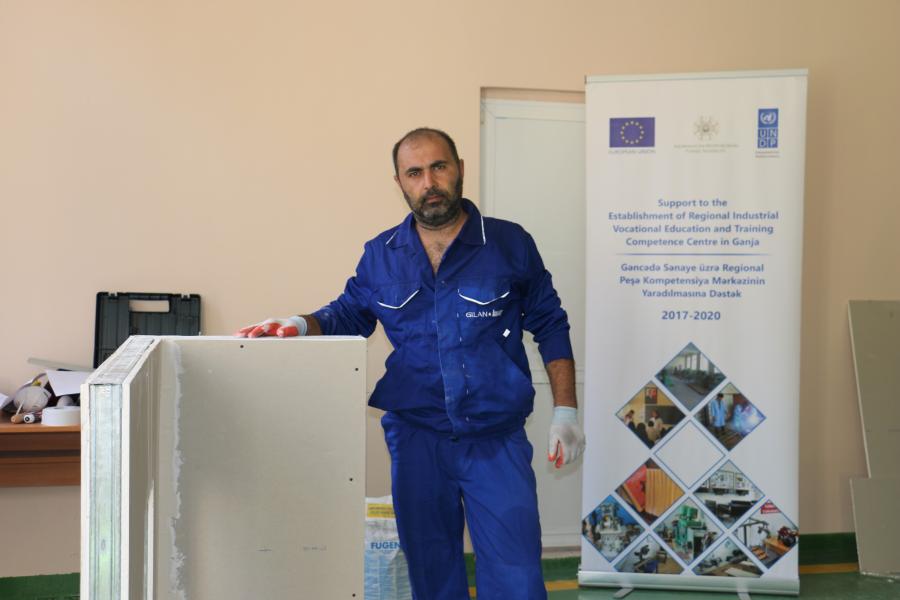Validation of non-formal and informal learning is creating new opportunities for workers in Azerbaijan’s informal sector with the financial support of the EU
03 May 2021
- Working in the informal sector is precarious at the best of times, but in the midst of a pandemic the livelihoods of plumbers, plasterers and other skilled freelancers surviving from one job to the next are even more at risk.

‘I’ve been working as a plasterer for thirteen years now and it’s never been so tough as now,’ says 34-year-old Zeynal Zeynalov. ‘What’s made it worse is that there’s always been a kind of free-for-all in this sector, so you’re competing for jobs and fees with people who have no training or experience.’
Zeynal is one of some twenty percent of the population who currently work in the informal sector in Azerbaijan.
Supporting the sustainable development of this sector is key not only to all these livelihoods but also to the country’s aim of diversifying its economy.
This is why UNDP has been working closely in recent years with the EU and the Government of Azerbaijan to modernise vocational education and training (VET) and thus encourage more people to gain additional skills.
An important aspect of modernising VET and reducing the precarity of working in the informal sector is to ensure equal opportunities for training and to develop a robust system of certification for skills.
As part of these efforts, and in line with its wider commitment to supporting VET and economic diversification, EU and UNDP have been working with Azerbaijan’s State Agency on Vocational Education and the Education Quality Assurance Agency (EQAA).
The outcome of this collaboration is the country’s first-ever validation process for certifying competences acquired through non-formal and informal learning.
Zeynal is one of 16 candidates to benefit from this new validation scheme, having applied to take part in the first official examination for a certificate in drywall plastering at the Ganja State Vocational Education School on Industry and Technologies.
All of the candidates underwent a self-assessment process, a written test, and a practical task.
The examination committee that assessed Zeynal’s skills included representatives from the EQAA, the Ministry of Labour and Social Protection of the Population, an international expert specialized in validation processes of non-formal and informal learning, and two local field experts.
In addition, the assessment committee included representatives from Knauf Marketing Baku – a German company with outstanding expertise in construction and construction materials.
The candidates who successfully passed all the tests received official certificates from the Education Quality Assurance Agency.
‘It’s hard to describe how important this piece of paper is for me,’ says Zeynal. ‘I’ve been hoping for something like this for years. With this certificate I can prove my skills and charge the right price for my work. It makes me stand out from the rest when competing for jobs – and that’s only fair if you’ve put all the effort into learning your trade. I’m pretty sure it will be easier for me to get more regular work now.’
This new validation process is part of a bigger project to modernise Azerbaijan’s vocational education and training system, entitled ‘Support for the establishment of Regional Industrial Vocational Education and Training Competence Centre in Ganja’.
Funded by the EU and implemented by UNDP and the State Agency on Vocational Education, this project has already organised expert training programmes bringing together VET experts, private sector representatives and field consultants to conduct the validation process.
The Education Quality Assurance Agency will now continue to assess, recognise and certify this process for several specialties, thus ensuring sustainability.
The new validation framework is a great step forward in modernising VET, reducing inequalities in employment, and creating equal educational opportunities for all citizens in Azerbaijan.

